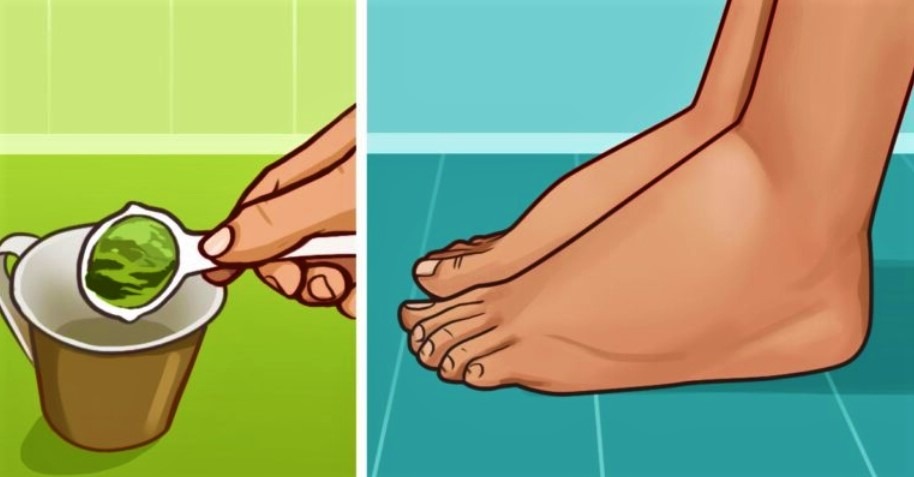Water retention can also be known as fluid retention or edema, and it occurs when too much fluid builds up inside the body. It is usually within the circulatory system or within tissue or cavities, and it can commonly cause swelling in the hands, feet, ankles and legs. There are some reasons for fluid retention which are not serious, and women in particular can experience it regularly as part of their reproductive cycle.
Water retention can also be a symptom of a severe medical condition, however, such as kidney disease. If you have sudden and unexplained water retention, seek medical help immediately. In other cases where the swelling or discomfort is mild, try these simple home remedies to alleviate the issue.
1. Eat less salt.
Healthline explains that sodium binds to water in the body and helps to maintain the balance of fluids in and around cells. If you eat too much sodium, your body will retain too much water. If you think you don’t add much salt to your diet, look at the nutritional information on the packaging of your favorite processed foods and you might be in for a shock. The sodium count on items such as canned soup or potato chips is incredibly high.
Click ‘Next Page (>)’ to keep reading and don’t forget to SHARE with your Facebook friends
2. Exercise regularly.
Exercise is vital for healthy circulation, without which the blood flow and pressure in your capillaries can affect fluid retention in your lower limbs. Medical News Today recommends raising your legs several times a day to avoid this, and exercising regularly. Support stockings can also be useful, particularly among older people or those with varicose veins.
3. Take magnesium.
This important mineral is involved in more than 300 enzymatic reactions that keep the body functioning healthily, according to Healthline. Studies have shown that magnesium supplements can reduce water retention in women with premenstrual symptoms , also known as PMS. Healthy sources of magnesium are almonds, whole grains and leafy green vegetables, and good-quality, dark chocolate.
Click ‘Next Page (>)’ to keep reading and don’t forget to SHARE with your Facebook friends
4. Increase your protein.
Medical News Today explains that people with protein deficiencies can struggle with water retention because their bodies are unable to get the water from the tissue spaces back into the capillaries. This is the key reason you see distended stomachs on malnourished people.
5. Try Vitamin B6.
This vitamin has been shown to be effective at reducing water retention in women with PMS and can easily be gained from bananas, potatoes, walnuts and meat – or a supplement.
Click ‘Next Page (>)’ to keep reading and don’t forget to SHARE with your Facebook friends
6. Take diuretics.
Diuretics help to decrease fluids in the body through urination, and although you can take them in the form of medication, you can just as easily find them in food. Onions, beans, leafy greens, pineapple, parsley and grapes are foods that act as diuretics, according to Livestrong. Coffee is another quick way to increase urination and decrease your fluid retention, although caffeine can cause other side effects, too.
7. Get your daily potassium.
Potassium is another natural way to increase urination and decrease fluid retention, notes Livestrong. All meats are a good source of potassium, as well as broccoli, peas and potatoes, and a number of fruits, milk, yogurt and nuts.
Click ‘Next Page (>)’ to keep reading and don’t forget to SHARE with your Facebook friends
8. Try dry brushing.
Step to Health explains that you need a natural bristle brush to do dry brushing. This method aids in lymphatic drainage and the removal of liquids from the body. Use the brush all over your body for 10 to 20 minutes. If you need to urinate shortly afterward, you’ll know that it has worked. Other benefits include soft, glowing skin and better circulation.
9. Put down refined carbs.
Refined carbohydrates cause spikes in blood sugar and insulin, which then causes your body to retain more sodium. You already know what happens with excess sodium: excess water retention. Refined carbs include processed sugars and grains.
Click ‘Next Page (>)’ to keep reading and don’t forget to SHARE with your Facebook friends
10. Drink more water.
It might feel counterintuitive, but drinking water is essential if you are bloated. It helps to flush excess liquids out of the body. Step to Health warns, however, that we need to drink water on an empty stomach for it to have this effect. Therefore, get into the practice of drinking two glasses of water before breakfast and again just before bed – provided you’ve finished dinner a couple of hours earlier.
Bloating and swelling can be uncomfortable and unsightly, but when it isn’t related to a health condition you can make lifestyle and dietary changes to reduce it. Be aware of how much sodium and refined carbs you are eating – levels are so high in processed and packaged foods that we’re often doubling our daily intake without even realizing it.
Drink water and get plenty of exercise. If these home tips don’t seem to cause any change, speak to your doctor to make sure you don’t have an underlying health issue.
From: topictrendy.com
